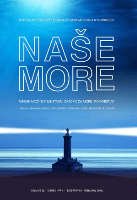
Nase More
Scope & Guideline
Innovating Solutions for a Sustainable Future
Introduction
Aims and Scopes
- Maritime Technology and Engineering:
Research on innovative maritime technologies, including propulsion systems, vessel design, and performance optimization, highlighting advancements that enhance efficiency and sustainability. - Marine Environmental Studies:
Investigations into the ecological impact of maritime activities, including pollution, invasive species, and conservation efforts, emphasizing the need for sustainable practices in marine environments. - Maritime Safety and Regulations:
Analysis of maritime safety measures, international regulations, and their implications for shipping and port operations, focusing on improving safety standards and compliance. - Data Analysis and Computational Modeling:
Utilization of data mining, machine learning, and computational fluid dynamics to model maritime phenomena, optimize operations, and predict outcomes in marine environments. - Interdisciplinary Approaches to Maritime Issues:
Integration of various disciplines such as ecology, engineering, and social sciences to address complex maritime challenges and promote comprehensive solutions.
Trending and Emerging
- Sustainable Maritime Practices:
An increasing focus on sustainability in maritime operations, including studies on eco-friendly technologies and practices aimed at reducing environmental footprints. - Advanced Data Analytics in Marine Safety:
A growing trend in utilizing advanced data analytics, such as deep learning and machine learning, to enhance marine safety and operational efficiency. - Impact of Climate Change on Marine Ecosystems:
Research addressing the impacts of climate change on marine biodiversity and ecosystem health, highlighting the urgency of adaptive management strategies. - Integration of Smart Technologies in Shipping:
Emerging interest in the application of smart technologies, such as IoT and AI, in shipping and port operations to improve efficiency and safety. - Human Factors in Maritime Operations:
Increasing attention to the human dimensions of maritime operations, including crew training, safety culture, and the socio-economic impacts of maritime work.
Declining or Waning
- Traditional Maritime Practices:
Research focused on historical or traditional maritime practices has decreased, possibly as the field shifts towards more innovative and technologically driven approaches. - Basic Marine Biology Studies:
While marine biology remains relevant, studies focusing solely on basic biological assessments without applied or technological context are less frequently published. - Economic Analysis of Maritime Industries:
Economic analyses that do not incorporate technological advancements or environmental considerations are becoming less prominent as the journal emphasizes more integrative studies. - Generalized Regulatory Frameworks:
Papers discussing broad regulatory frameworks without specific case studies or applications have seen a decline, indicating a preference for more targeted and practical insights. - Static Environmental Impact Assessments:
There is a waning interest in static assessments that do not account for dynamic environmental changes or technological impacts, reflecting a shift towards more adaptive and responsive research.
Similar Journals
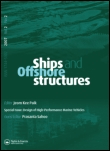
Ships and Offshore Structures
Advancing Innovation in Maritime Design and OperationsShips and Offshore Structures, published by Taylor & Francis Ltd, is a premier academic journal dedicated to advancing research in the fields of mechanical and ocean engineering. With an esteemed ISSN of 1744-5302 and an E-ISSN of 1754-212X, this journal has established a strong reputation, reflected in its Q2 ranking in both the Mechanical Engineering and Ocean Engineering categories, as well as its impressive Scopus rankings. The journal provides a platform for the publication of high-quality, peer-reviewed articles that address innovative design, construction, and operational challenges faced in the maritime and offshore industries. Although the journal does not currently offer open access, its accessibility through institutional subscriptions ensures that it remains a valuable resource for researchers, professionals, and students alike. By fostering interdisciplinary dialogue and disseminating cutting-edge research, Ships and Offshore Structures plays a crucial role in shaping the future of marine technology and engineering practices on a global scale.

International Journal of Marine and Coastal Law
Navigating the Legal Waters of Marine and Coastal EnvironmentsThe International Journal of Marine and Coastal Law, published by Martinus Nijhoff Publishers, is a leading academic periodical dedicated to the exploration of legal aspects related to marine and coastal environments. With a strong emphasis on interdisciplinary research, this journal serves as a vital resource for scholars, practitioners, and policymakers engaged in areas such as environmental science, oceanography, and law. Since its inception in 1986, the journal has continuously evolved to address contemporary challenges in the field, boasting a commendable Q2 ranking in Law and Q3 rankings across various relevant categories. The journal facilitates rigorous discourse on pressing issues, providing a platform for high-quality research that aims to inform legal frameworks and enhance sustainable practices. Although it does not offer open access, the journal’s impact extends to its notable Scopus rankings and its essential role in shaping legal discourse on marine and coastal management. Researchers and professionals will find invaluable insights and scholarly contributions that are crucial for advancing knowledge and policy in this critical area of study.
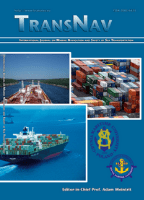
TransNav-International Journal on Marine Navigation and Safety of Sea Transportation
Charting New Waters in Ocean Engineering.TransNav - International Journal on Marine Navigation and Safety of Sea Transportation is a leading scholarly publication that addresses the critical themes of marine navigation and maritime safety. Published by Gdynia Maritime University in Poland, this open-access journal has been a vital resource since its inception in 2007, fostering a global dialogue among researchers, maritime professionals, and students. With an impressive trajectory of convergence from 2019 to 2024, TransNav is recognized for its impact in the realm of Ocean Engineering, Oceanography, and Transportation, holding a notable Q3 ranking in Ocean Engineering and Q4 rankings in both Oceanography and Transportation for 2023. The journal serves as an essential platform for disseminating research findings and advancements that enhance safety protocols and navigation strategies in sea transportation, thus contributing to the sustainability and efficiency of maritime operations worldwide. Researchers can access its wealth of information through various academic databases, ensuring that your work remains on the cutting edge of this vital field.

Journal of Eta Maritime Science
Advancing maritime knowledge for a sustainable future.Welcome to the Journal of Eta Maritime Science, an esteemed publication dedicated to advancing the field of maritime science and engineering. Published by GALENOS PUBL HOUSE in Turkey, this Open Access journal has been facilitating scholarly communication since 2013, ensuring that groundbreaking research is accessible to experts and enthusiasts alike. With its E-ISSN 2148-9386, the journal covers a broad spectrum of topics within maritime engineering and related disciplines. Currently positioned in the Q3 category of Engineering (miscellaneous) according to the 2023 rankings, the journal ranks #142 out of 204 in its field and is recognized within the 30th percentile on Scopus, showcasing its growing influence. Researchers, professionals, and students looking to contribute to and engage with cutting-edge maritime science will find a vibrant community and a platform for their work in this journal.

Journal of Marine Science and Technology-Taiwan
Pioneering insights into the marine world.The Journal of Marine Science and Technology-Taiwan, published by Nant Taiwan Ocean University, is a pivotal academic platform dedicated to the advancement of knowledge in the fields of marine science and engineering. With an ISSN of 1023-2796 and E-ISSN 2709-6998, this journal spans a wide array of topics relevant to the study and application of marine technology from 1998 to 2024. It ranks in the Q3 quartile in major categories such as Mechanical Engineering, Mechanics of Materials, and Ocean Engineering, illustrating its growing influence and the breadth of research it encompasses. Although currently not an open access journal, it provides critical insights to researchers, professionals, and students alike, making significant contributions to the understanding of marine environments and technologies. As the journal continues to evolve, its commitment to high-quality, impactful research remains central to its mission, empowering scholars to drive innovation in the dynamic field of marine science.

Journal of Maritime Archaeology
Charting New Waters in Archaeological ResearchThe Journal of Maritime Archaeology, published by Springer, is a premier scholarly platform dedicated to advancing the understanding of maritime cultural heritage and underwater archaeology. With an ISSN of 1557-2285, this journal has continuously contributed to the field since its inception in 2006 and is set to celebrate its evolution until 2024. Holding a distinguished position as a Q1 journal in the field of Archaeology (Arts and Humanities) as of 2023, it ranks impressively at #96 out of 413 journals in its category, placing it in the 76th percentile of its field. This journal aims to disseminate high-quality research that explores the interplay between maritime environments and human activities, showcasing innovative methodologies, historical narratives, and cultural analyses. Researchers, professionals, and students engaged in maritime studies will find this journal an invaluable resource for advancing knowledge and fostering international collaboration in this vital area of archaeology.

Pomorstvo-Scientific Journal of Maritime Research
Navigating the Future of Maritime ResearchPomorstvo-Scientific Journal of Maritime Research, published by the University of Rijeka's Faculty of Maritime Studies, serves as a vital platform in the fields of maritime studies and related disciplines. With an Open Access policy established since 2006, this journal fosters the dissemination of peer-reviewed research covering a diverse range of topics within Engineering, Geography, Ocean Engineering, and Social Sciences, making it an essential resource for researchers, professionals, and students alike. As of 2023, it holds a commendable profile with Q3 rankings in multiple categories, including Engineering and Geography, highlighting its ongoing commitment to quality scholarship. Accessible from Croatia, and included in Scopus with significant rankings, the journal aims to promote innovative and practical maritime research, contributing significantly to the advancement of knowledge and policy within the maritime community.
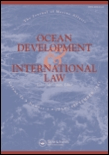
OCEAN DEVELOPMENT AND INTERNATIONAL LAW
Fostering Dialogue on Global Marine Resource ManagementOCEAN DEVELOPMENT AND INTERNATIONAL LAW, published by Taylor & Francis Inc, is an esteemed journal dedicated to the interdisciplinary study of ocean governance, environmental law, and international relations concerning marine resources. With an ISSN of 0090-8320 and an E-ISSN of 1521-0642, this journal serves as a vital platform for researchers, legal scholars, and policymakers interested in the evolving challenges of ocean development in a globalized context. The journal has established itself as a resourceful publication, evidenced by its ranking in the 2023 Scopus categories, where it is positioned in the 75th percentile for Law and the 66th percentile for Political Science and International Relations. Operating for over four decades, from 1973 until 2024, it is pivotal for advancing knowledge and fostering dialogue on critical issues such as environmental sustainability, international maritime policies, and legal frameworks governing the seas. Despite being a subscription-based journal, OCEAN DEVELOPMENT AND INTERNATIONAL LAW remains influential, offering significant insights that contribute to the development of effective legal instruments and governance strategies for oceanic resources.
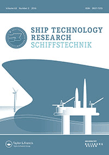
Ship Technology Research
Elevating ocean engineering through collaborative insights.Ship Technology Research, published by Taylor & Francis Ltd, is a premier journal dedicated to advancing the field of ocean engineering. Established in 1995, this journal provides a critical platform for cutting-edge research, innovative methodologies, and the latest developments in ship technology. With a notable Q2 ranking in the Ocean Engineering category for 2023 and placing in the 70th percentile of Scopus rankings, the journal serves as an essential resource for professionals, researchers, and students aiming to enhance their knowledge and contribute to maritime advancements. The journal not only disseminates high-quality research but also encourages collaboration across disciplines, addressing the real-world challenges faced in ship design, operation, and technology. As a non-open access journal, it continues to uphold rigorous standards, ensuring that published work is both relevant and impactful in fostering innovation in the maritime industry.

Maritime Transport Research
Exploring New Horizons in Maritime TransportMaritime Transport Research is a cutting-edge journal dedicated to advancing knowledge and innovation within the field of maritime transport. Published by ELSEVIER, this Open Access journal has been active since 2020, providing researchers, professionals, and students with free and unrestricted access to high-quality research content. With an impressive impact factor and categorized in the Q2 quartile for the field of Transportation, this journal ranks #50 out of 141 in Scopus' Social Sciences _ Transportation category, placing it in the 64th percentile among its peers. Maritime Transport Research aims to foster interdisciplinary dialogue and promote scholarly advancements by publishing original research, reviews, and case studies that address the complexities and dynamics of maritime logistics, policy, and technology. Located in the United Kingdom, this journal is a vital resource for anyone engaged in maritime studies, highlighting its commitment to supporting the academic community through rigorous and impactful research.